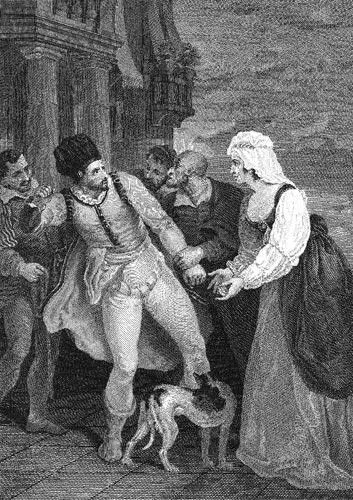Off.
He is my prisoner; if I let him go,
The debt he owes will be requir’d of me.
Adr.
I will discharge thee ere I go from thee:
Bear me forthwith unto his creditor,
And knowing how the debt grows, I will pay it.
Good Master Doctor, see him safe convey’d
Home to my house. O most unhappy day!
E. Ant.
O most unhappy strumpet!
E. Dro.
Master, I am here ent’red in bond for you.
E. Ant.
Out on thee, villain, wherefore dost thou mad me?
E. Dro.
Will you be bound for nothing? Be mad, good master,
Cry “The devil!”
Luc.
God help, poor souls, how idlely do they talk!
Adr.
Go bear him hence. Sister, go you with me.
Exeunt. Manent Officer, Adriana, Luciana, Courtezan.
Say now, whose suit is he arrested at?
Off.
One Angelo, a goldsmith. Do you know him?
Adr.
I know the man; what is the sum he owes?
Off.
Two hundred ducats.
Adr.
Say, how grows it due?
Off.
Due for a chain your husband had of him.
Adr.
He did bespeak a chain for me, but had it not.
Cour.
When as your husband all in rage to-day
Came to my house, and took away my ring—
The ring I saw upon his finger now—
Straight after did I meet him with a chain.
Adr.
It may be so, but I did never see it.
Come, jailer, bring me where the goldsmith is,
I long to know the truth hereof at large.
Enter Antipholus [of] Syracusa, with his rapier drawn, and Dromio [of] Syracusa.
Luc.
God for thy mercy! they are loose again.
Adr.
And come with naked swords: let’s call more help
To have them bound again.
Off.
Away, they’ll kill us.
Exeunt omnes [but Antipholus of Syracuse and Dromio of Syracuse] as fast as may be, frighted.
S. Ant.
I see these witches are afraid of swords.
S. Dro.
She that would be your wife now ran from you.
S. Ant.
Come to the Centaur, fetch our stuff from thence;
I long that we were safe and sound aboard.
S. Dro. Faith, stay here this night, they will surely do us no harm. You saw they speak us fair, give us gold: methinks they are such a gentle nation that, but for the mountain of mad flesh that claims marriage of me, I could find in my heart to stay here still, and turn witch.
S. Ant.
I will not stay to-night for all the town:
Therefore away, to get our stuff aboard.
Exeunt.
¶
 Francis Wheatley , p. — James Stow , e.
Francis Wheatley , p. — James Stow , e.
Enter the [Second] Merchant and [Angelo] the goldsmith.
Ang.
I am sorry, sir, that I have hind’red you,
But I protest he had the chain of me,
Though most dishonestly he doth deny it.
[2. E.] Mer.
How is the man esteem’d here in the city?
Ang.
Of very reverent reputation, sir,
Of credit infinite, highly belov’d,
Second to none that lives here in the city:
His word might bear my wealth at any time.
[2. E.] Mer.
Speak softly, yonder, as I think, he walks.
Enter Antipholus [of Syracuse] and Dromio [of Syracuse] again.
Ang.
’Tis so; and that self chain about his neck,
Which he forswore most monstrously to have.
Good sir, draw near to me, I’ll speak to him.
Signior Antipholus, I wonder much
That you would put me to this shame and trouble,
And, not without some scandal to yourself,
With circumstance and oaths so to deny
This chain which now you wear so openly.
Beside the charge, the shame, imprisonment,
You have done wrong to this my honest friend,
Who, but for staying on our controversy,
Had hoisted sail and put to sea to-day.
This chain you had of me, can you deny it?
S. Ant.
I think I had, I never did deny it.
[2. E.] Mer.
Yes, that you did, sir, and forswore it too.
S. Ant.
Who heard me to deny it or forswear it?
[2. E.] Mer.
These ears of mine thou know’st did hear thee;
Fie on thee, wretch, ’tis pity that thou liv’st
To walk where any honest men resort.
S. Ant.
Thou art a villain to impeach me thus:
I’ll prove mine honor and mine honesty
Against thee presently, if thou dar’st stand.
[2. E.] Mer.
I dare, and do defy thee for a villain.
They draw.
Enter Adriana, Luciana, Courtezan, and others.
Adr.
Hold, hurt him not for God sake! he is mad.
Some get within him, take his sword away:
Bind Dromio too, and bear them to my house.
S. Dro.
Run, master, run, for God’s sake take a house!
This is some priory, in, or we are spoil’d.
Exeunt [Antipholus of Syracuse and Dromio of Syracuse] to the priory.
Enter Lady Abbess.
Abb.
Be quiet, people. Wherefore throng you hither?
Adr.
To fetch my poor distracted husband hence.
Let us come in, that we may bind him fast,
And bear him home for his recovery.
Ang.
I knew he was not in his perfect wits.
[2. E.] Mer.
I am sorry now that I did draw on him.
Abb.
How long hath this possession held the man?
Adr.
This week he hath been heavy, sour, sad,
And much different from the man he was;
But till this afternoon his passion
Ne’er brake into extremity of rage.
Abb.
Hath he not lost much wealth by wrack of sea?
Buried some dear friend? Hath not else his eye
Stray’d his affection in unlawful love—
A sin prevailing much in youthful men,
Who give their eyes the liberty of gazing?
Which of these sorrows is he subject to?
Adr.
To none of these, except it be the last,
Namely, some love that drew him oft from home.
Abb.
You should for that have reprehended him.
Adr.
Why, so I did.
Abb.
Ay, but not rough enough.
Adr.
As roughly as my modesty would let me.
Abb.
Haply, in private.
Adr.
And in assemblies too.
Abb.
Ay, but not enough.
Adr.
It was the copy of our conference:
In bed he slept not for my urging it;
At board he fed not for my urging it;
Alone, it was the subject of my theme;
In company I often glanced it;
Still did I tell him it was vild and bad.
Abb.
And thereof came it that the man was mad.
The venom clamors of a jealous woman
Poisons more deadly than a mad dog’s tooth.
It seems his sleeps were hind’red by thy railing,
And thereof comes it that his head is light.
Thou say’st his meat was sauc’d with thy upbraidings:
Unquiet meals make ill digestions,
Thereof the raging fire of fever bred,
And what’s a fever but a fit of madness?
Thou say’st his sports were hind’red by thy brawls:
Sweet recreation barr’d, what doth ensue
But moody and dull melancholy,
Kinsman to grim and comfortless despair,
Читать дальше

 Francis Wheatley , p. — James Stow , e.
Francis Wheatley , p. — James Stow , e.










